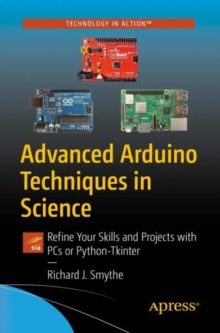Description
| Product ID: | 9781484267868 |
| Product Form: | Paperback / softback |
| Country of Manufacture: | US |
| Title: | Advanced Arduino Techniques in Science |
| Subtitle: | Refine Your Skills and Projects with PCs or Python-Tkinter |
| Authors: | Author: Richard J. Smythe |
| Page Count: | 279 |
| Subjects: | Computer hardware, Computer hardware, Computer programming / software engineering, Computer programming / software development |
| Description: | Select Guide Rating If you’re already a comfortable programmer, familiar with your single board computer and microcontroller, and are ready to refine your projects, then let’s get started! This book covers advanced methods and techniques for creating, implementing, monitoring and controlling your experiments and projects with your Raspberry Pi and Arduino. Projects will use Python and the Tkinter GUI and will also cover software development for adding real time data display to the Raspberry Pi. You'll review concepts of frequency occurring in nature and the techniques used to measure the frequency of electrically varying signal voltages. You'll also study procedures for safe design, implementation and operation of experimental measurement systems operating at high heats and high temperatures. Throughout the book you'll look at sources and types of errors, and best practices for minimizing and reducing them. Often times there are simple environmental issues hindering what would seem to be simple projects: high temperatures, controlling the power for elevated temperature with the proportional integral and derivative (PID) algorithm, and the limitations imposed by eight bit code, the influence of noise and errors in measured data, and many more. Advanced Arduino Techniques in Science provides the best tools to move past those restrictions. What You’ll LearnImplement an experimental control system and graphical data display for the Raspberry Pi and ArduinoManage experimental control with PID algorithm implementation, tuning and limitations imposed by eight bit digital signalsBuild an analytical front end Examine data smoothing capability of the Kalman filterExplore available methods for measuring both high and low frequency values in electronic signalsWho This Book Is ForEducators, researchers, students, makers, citizen scientists, or hobbyists can all extend their measuring capability or improve upon the quality of their collected data. The book is directed to those with intermediate skills in programming and those who are comfortable with Python programming and Arduino C. If you''re already a comfortable programmer, familiar with your single board computer and microcontroller, and are ready to refine your projects, then let''s get started! This book covers advanced methods and techniques for creating, implementing, monitoring and controlling your experiments and projects with your Raspberry Pi and Arduino. Projects will use Python and the Tkinter GUI and will also cover software development for adding real time data display to the Raspberry Pi. You''ll review concepts of frequency occurring in nature and the techniques used to measure the frequency of electrically varying signal voltages. You''ll also study procedures for safe design, implementation and operation of experimental measurement systems operating at high heats and high temperatures. Throughout the book you''ll look at sources and types of errors, and best practices for minimizing and reducing them. Often times there are simple environmental issues hindering what would seem to be simple projects: high temperatures, controlling the power for elevated temperature with the proportional integral and derivative (PID) algorithm, and the limitations imposed by eight bit code, the influence of noise and errors in measured data, and many more. Advanced Arduino Techniques in Science provides the best tools to move past those restrictions. What You''ll Learn
Who This Book Is For |
| Imprint Name: | APress |
| Publisher Name: | Springer-Verlag Berlin and Heidelberg GmbH & Co. KG |
| Country of Publication: | GB |
| Publishing Date: | 2021-08-19 |


